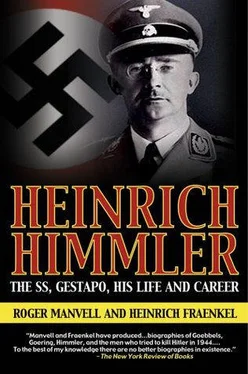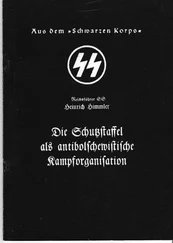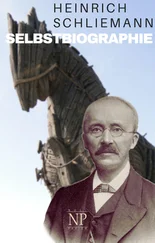‘He’s done it’, shouted the doctor.
Both the colonel and the sergeant jumped on Himmler and threw him to the ground, turning him on his stomach to prevent him swallowing. The doctor held him by the throat, trying to force him to spit out the poison. The struggle to preserve his life by using emetics and a stomach-pump lasted a quarter of an hour; every method of artificial respiration was used. ‘He died,’ said the sergeant, ‘and when he died we threw a blanket over him, and left him.’ 21
Two days later, Himmler was buried in an unmarked place near Lüneburg; his body had been wrapped in army blankets and wound in camouflage netting secured with telephone wire. Sergeant-Major Austin, who in civilian life had been a dustman, dug him a secret grave.
Appendix A: Adolf Eichmann’s Account of Himmler
Prior to his trial in Israel, Adolf Eichmann voluntarily submitted to a very thorough examination, during the course of which hundreds of documents (most of them photostats of affidavits and of R.S.H.A. files) were sifted and discussed. The examination started on 29 May 1960 and continued in almost daily sessions to 15 January 1961; 76 tapes produced 3,564 pages of typescript, a verbatim account of the entire interrogation which, through the courtesy of the Israeli Embassy in London, we were given the opportunity to study.
Eichmann proved eager to co-operate with his interrogators; he became as obsequious as he must once have been to his former superiors. He was proud of his punctiliousness in obeying orders, and he delighted in describing filing systems and other office routine in considerable detail. He claimed he had originally joined the S.S. during 1931—2 (he was not sure of the exact date) through the influence of Kaltenbrunner, whom he had known well since childhood. Later, he had applied to join the S.D. and was appointed a clerk in the ‘Freemason Museum’; subsequently, as we have seen, he became a specialist in Jewish affairs.
During the interrogation, Eichmann emphasized again and again that it was Hitler who ordered the physical destruction of the Jews, while Himmler was charged with issuing the necessary orders. Eichmann first describes Himmler (pp. 38—9) as ‘always ready to oblige the Führer, liable to get bogged down in petty detail, but then again, quite impulsively, signing some far-reaching decree.’ On p. 146 Eichmann reverts to Himmler’s impulsiveness in giving these far-reaching orders whenever he was struck by some idea; as often as not such orders would be passed on to any officer who happened to be with him at the time and later held up by red tape as soon as they had reached the appropriate official channels.
Eichmann mentions Himmler’s aversion to seeing fingers stained with nicotine. Officers ordered into Himmler’s presence were advised to use the lemon and pumice-stone available in the washroom of Himmler’s special train. Anyone failing to do so risked getting a three or six months’ Rauchverbot ; this meant instant dismissal from the S.S. if he were caught smoking during that period.
In Minsk Eichmann witnessed the mass-shooting of Jews straight into the ditch, and a little later (p. 240) he claims that Heydrich out of sheer bravado gave orders to kill Jews who were already being killed by Globocnik’s orders. Heydrich said, ‘I herewith authorize you to submit a further 150,000 Jews to the final solution [der Endlosung zuzuführen ].’ Eichmann in fact seemed uncertain whether the figure might not have been 250,000 in this case. In the autumn of 1941 he was sent for by Himmler, along with Mueller, to report about these matters (p. 263). The interview took a mere five minutes.
Eichmann has much to say about the S.S. euphemisms, such as ‘final solution’ and ‘special treatment’. Even at the notorious conference at Wannsee (see page 127) direct references to killing were avoided, Heydrich favouring the term Arbeitseinsatz im Osten (labour assignment in the East). Another point frequently mentioned by Eichmann (for example, on pages 135-6, 1020, 2028, 2167) is the fact that Himmler considered the camp at Theresienstadt very much his own domain, insisting on giving all the necessary orders for this place personally. As previously mentioned, he was very keen on maintaining the myth of Theresienstadt as the Altersghetto, suggesting it was a place where elderly Jews could live out their lives in peace and comfort, and was very angry whenever news leaked through of inmates from Theresienstadt being sent to the gas-ovens in Auschwitz and other extermination camps. Yet since the camp’s maximum capacity was 10,000, he did nothing to stop hundreds of thousands of victims from Theresienstadt being ‘evacuated’. He merely insisted on the strictest secrecy so as not to offend world opinion.
At all times Himmler was specially interested in ‘prominent’ prisoners; hence (p. 2608) we find him giving special orders for Fray Glück, the sister of La Guardia, the Mayor of New York, to be taken out of a mass transport and to be transferred to the camp where Léon Blum, Odette Churchill and other important prisoners were held.
On pp. 2456 et seq. Eichmann shows his surprise at documentary evidence of Himmler having devoted much time during the difficult years of 1943—4 to such petty details as the question of two or three Jews in one case and five or six in another being exempted from extermination on account of their expertise in metallurgy and diamonds respectively, experts in that field being required for the armaments industry and for the production of the highest grade of Knight’s Cross.
There are several references (such as those on pp. 1249, 1290 and 1318) to Himmler’s orders of October 1941 stopping any emigration of Jews, ‘except in isolated instances beneficial for the Reich’ (which refers to Jews wealthy enough to pay a minimum of 100,000 Swiss francs). In July 1944 Himmler issued an order that the emigration of certain Hungarian Jews to Palestine must be stopped ‘because they are biologically potent, so their survival is not desirable in the interests of the Reich.’ But in April 1942 (p. 478) Himmler wrote to the Chief of the S.D. stating that while the Führer’s orders for the ‘final solution’ must be carried out ruthlessly, he wanted those Jews and Jewesses still capable of work to be exempted for the time being and set to work in the concentration camps. In July 1942 neither Eichmann not his chief Mueller dared to decide about the fate of French Jewish children still cared for by French welfare organizations (p. 701—2). Mueller asked Himmler for a decision, and the Reichsführer’s personal order came for ‘sending all of them East’, that is, having them killed. On pp. 660 et seq. there are details about Himmler’s personal orders for a Grossabschiebung (mass removal) of French Jews eastwards for the ‘final solution’.
The last time Eichmann saw Himmler was during the spring of 1945, when Himmler told him that in the case of future negotiations with Eisenhower he wanted some 200 to 300 prominent Jews ‘for hostage purposes’. Eichmann was to collect them in various camps, and see Gauleiter Hofer in Innsbruck about allocating some evacuated villages for them. Eichmann dutifully reported the Reichsführer’s order to Kaltenbrunner, who, according to Eichmann, ‘showed little interest, since nothing really mattered any longer’.
Appendix B: The Frankfurt Trial 1964-5
By the time this book is published, the Auschwitz Trial at Frankfurt will have been in session for almost a year, and yet be nowhere near its end. Similar trials (such as that of Eichmann’s associates, Hunsche and Krumey, in Budapest) have been or are running concurrently in Frankfurt and elsewhere, while others are being prepared.
Читать дальше











